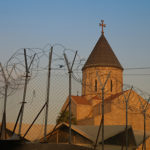WASHINGTON (ABP) — On the eve of a global Christian conference set to begin Oct. 16, Christian groups in the United States and elsewhere are protesting the Chinese government’s decision to prevent as many as 200 would-be participants from attending.
According to multiple news reports, the Chinese Christians have so far been barred from leaving their country for Cape Town, South Africa, site of the Third Lausanne Congress on World Evangelization. According to organizers, the conference will bring together 4,000 Christians from around the world “to confront the critical issues of our time — other world faiths, poverty, HIV/AIDS, persecution, among others — as they relate to the future of the church and world evangelization.”
“They said this is an illegal conference and they sent me home,” said Liu Guan, 36, an evangelical leader who was stopped at the airport when he tried to fly out of Beijing Oct. 10, according to The New York Times. “They said I can not go anywhere.”
“This is surprising and disappointing,” said National Association of Evangelicals President Leith Anderson, who plans to attend the gathering, according to a news release from the U.S. group. “The People’s Republic of China has recently welcomed dialogue with international Christians. I expected the Chinese to celebrate their presence and influence at Cape Town 2010 with delegations from 200 countries. I hope this is just a bureaucratic misunderstanding that will quickly be resolved so that China won't be the only country left out.”
Chinese officials have accused conference organizers of interfering in Chinese religious affairs by inviting members of China’s unregistered evangelical churches but not its officially state-sanctioned Protestant denomination.
In a statement released to the Times, Ma Zhaoxu, spokesman for China’s Ministry of Foreign Affairs, said Lausanne officials “secretly extended multiple invitations to Christians who privately set up meeting points.” And that the act “publicly challenges the principle of independent, autonomous, domestically organized, and therefore represents a rude interference in Chinese religious affairs.”
Lausanne officials have denied the charges, saying they invited representatives of the China Christian Council and the Three-Self Patriotic Movement, the officially sanctioned arms of Chinese Protestantism.
While Christians who belong to officially sanctioned churches enjoy a significant degree of religious liberty in China, the nation’s communist officials have repeatedly come under fire for violating the religious freedom of churches and Christians who don’t submit to state registration. In some parts of the country, local officials reportedly continue to arrest and otherwise persecute leaders of so-called “house churches” and other unofficial congregations.
Agencies that monitor international religious freedom have also criticized China for oppression of other religious minorities — especially Uighur Muslims in western China and practitioners of the Falun Gong faith.
Sign up for our weekly edition and get all our headlines in your inbox on Thursdays
–Robert Marus is managing editor and Washington bureau chief for Associated Baptist Press.














We seek to connect God’s story and God’s people around the world. To learn more about God’s story, click here.
Send comments and feedback to Eric Black, our editor. For comments to be published, please specify “letter to the editor.” Maximum length for publication is 300 words.